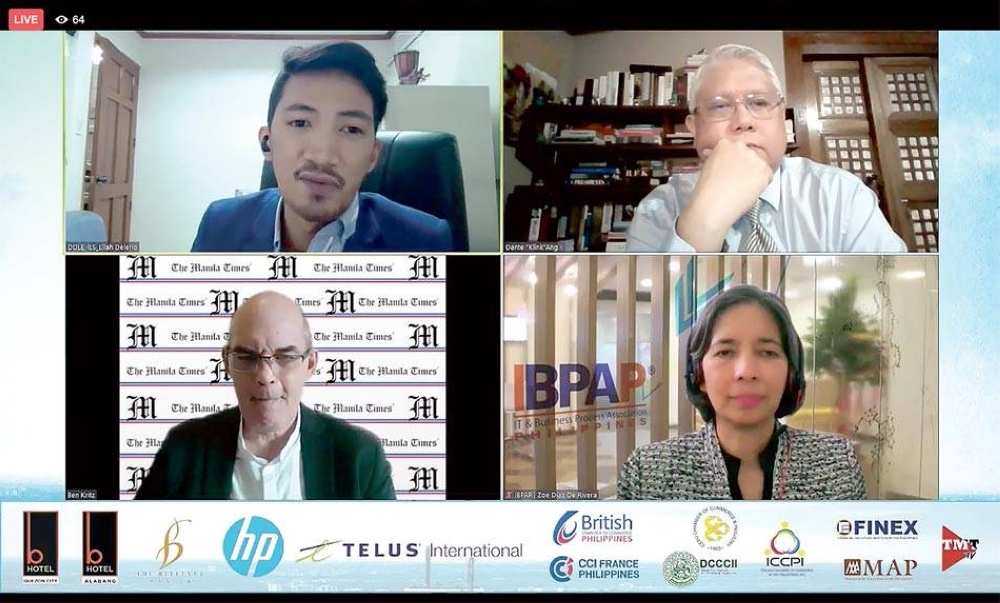
The country has a deep bench of talent that could help its business process outsourcing (BPO) industry attract more foreign clients.
Speaking Friday at The Manila Times online forum, “Resiliency and adaptability at all times of the BPO industry – bedrock of Philippine employment through the years,” Zoe Diaz de Rivera, the lead for Talent Attraction and Academe Linkages of IT & Business Process Association of the Philippines (Ibpap), said the Philippines has always had the potential to be a major international BPO hub.
De Rivera traced the emergence of the information technology and business process management (IT-BPM) industry in the country and how it continues to develop through the years.
An IT-BPM company manages work operations of foreign, local or multinational organizations as a third-party outsource provider or an offshore delivery location.
Its services include animation, contact center, game development, global in-house center, health information management and IT and software services.
According to de Rivera, the IT-BPM sector was born at the same time the internet was taking root in the 1980s.
More multinationals were coming into the country, which prompted the sector to reprogram so it could offer a variety of services to foreign companies, she said.
“When they realized that there is great talent from the Philippines who could easily communicate with the global workforce because of our proficiency and English being our second language…then the contact center came in and there was a sudden growth,” de Rivera said.
The Ibpap has six association members who work together to offer Filipinos job opportunities in the IT-BPM industry, de Rivera said. These are the Philippines Software Industry Association, Animation Council of the Philippines Inc., Contact Center Association of the Philippines, Healthcare Information Management Association of the Philippines, Game Developers Association of the Philippines and Global In-House Council of the Philippines.
The IT-BPM sector has 1.3 million direct employees, of which about 379,000 eare from countryside sites such as the cities of Iloilo, Davao, Cebu and Bacolod. “And we’re looking forward to bringing growth to these areas,” de Rivera said, citing Ibpap’s projection of 452,000 new direct hires by 2022.
From 2019 to 2021, 2D Digital Animation, 3D Asset Creation, Team Leadership, Six Sigma Yellow Belt, CG Creator Certification, Data Analysis with Certification, Certified Medical Coding, Medical Billing, and Software Application Development ranked among the IT-BPM priority skills.
“Even prior to the pandemic, we have been telling Filipinos to upscale because…everything is going digital…. Today, everybody has to learn something digital. We have to be able to use all the various tools as we do our work,” de Rivera said.
Looking ahead, de Rivera said Ibpap has launched its “Digital Cities 2025” to transform cities outside of Metro Manila into IT-BPM hubs.
“The opportunities here are not only for the big companies but even for small companies…looking for people who can help them online and grow the companies from all over because we have talents here, we can do this,” she said.
For de Rivera, the bigger goal of Ibpap is “to promote the Philippines as an IT-BPM destination all over the world.”
Speaking at the same forum, Labor Secretary Silvestre Bello 3rd credited the BPO sector for helping keep the economy afloat by easing the unemployment problem brought about by the restrictions to contain the spread of Covid-19.
“Notwithstanding these present challenges, the BPO industry continues to serve as one of the foremost economic drivers of our country, contributing a total of $27.6 billion in revenue, which is almost 1.5 percent growth in 2020 versus the figure from 2019,” Bello said.
BPO firms also hired 23,000 new full-time employees in 2020 under a flexible work arrangement, he added.
Labor department data also showed that aside from generating 1.3 million direct jobs, the industry also created 4.08 million indirect employment in different support industries like food, banking, real estate, hospitality and transportation.
It also promoted countryside development, creating 280,000 jobs in 23 provinces.
Bello said he sees a resurgence in the BPO sector amid the pandemic as global recession forces developed countries to outsource more jobs.
Against overwhelming odds, the Labor department has provided urgent support to spur business continuity through the inclusion of the private sector workers in the Covid-19 vaccination program.
“While we move forward to hopefully better times, the BPO industry can rely on our department to fulfill its undertaking to promote the welfare of our country’s human resources.”
He said a flexible work arrangement can help the BPO and other industries to protect their workers against Covid-19 infection.
“It’s a choice between dying of Covid and dying of hunger. That is the reality that we have to face,” he said.
Bello said that the Labor department, along with heads of the National Economic Development Authority and the Department of Trade and Industry, hopes that the government task force on the pandemic would come up with a substantial change in quarantine protocols.
“It is important to realize that we don’t talk only about the effects of Covid in terms of health, but that we talk of
Covid in terms of its effects on the employment situation,” he said.

Leave A Comment